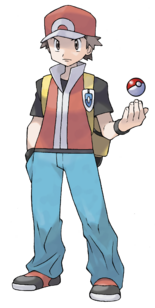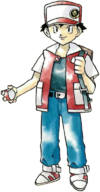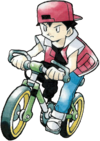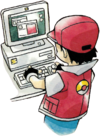Red (game): Difference between revisions
(→Trivia) |
(→Trivia) |
||
| Line 1,027: | Line 1,027: | ||
* Red's Generation II sprite is a colorized and mirrored version of his sprite from {{game|Yellow}}. The same thing occurred to his rival, {{ga|Blue}}. | * Red's Generation II sprite is a colorized and mirrored version of his sprite from {{game|Yellow}}. The same thing occurred to his rival, {{ga|Blue}}. | ||
* In HeartGold and SoulSilver, Red is the only Trainer in-game who uses the battle transition effect from Generation II. | * In HeartGold and SoulSilver, Red is the only Trainer in-game who uses the battle transition effect from Generation II. | ||
* Red and all of his Anime/Manga counterparts | * Red and all of his Anime/Manga counterparts owns a Pikachu. Excluding [[Satoshi]] from Pokemon Zensho who evolved it into a Raichu. | ||
==In other languages== | ==In other languages== | ||
Revision as of 18:27, 24 July 2012
| Red レッド Red | |
 Art from FireRed and LeafGreen | |
| Age | 11Wrong template. See Template:Sup/doc.Wrong template. See Template:Sup/doc. 14Wrong template. See Template:Sup/doc.Wrong template. See Template:Sup/doc. 16+Wrong template. See Template:Sup/doc. |
|---|---|
| Gender | Male |
| Hometown | Pallet Town |
| Region | Kanto |
| Relatives | Mother |
| Trainer class | Pokémon Trainer, Player character, Champion |
| Generation | I, II, III, IV, V |
| Games | Red, Green, Blue & Yellow Gold, Silver & Crystal FireRed, LeafGreen HeartGold, SoulSilver Black 2 and White 2 Pokémon Stadium, Stadium 2 |
| Anime counterpart | Ash Ketchum |
| Counterpart debut | Pokémon - I Choose You! |
| Manga counterpart(s) | Red, Isamu Akai |
Red (Japanese: レッド Red) is the canon name of the player character in the Generation I games Pokémon Red, Green, Blue, and Yellow and the male choice in their Generation III remakes Pokémon FireRed and LeafGreen, where his female counterpart is Leaf.
Red is known throughout Kanto and Johto as the Champion from Pallet Town, as well as for his defeat of Team Rocket in Kanto during his quest. He is the final opponent in the Generation II games Pokémon Gold, Silver, and Crystal, their Generation IV remakes Pokémon HeartGold and SoulSilver, and Pokémon Stadium 2.
In the games
Red is introduced as a curious 11-year-old boy from Pallet Town. In the instruction manuals of Pokémon Red, Green, and Blue Versions, Red gained an interest in Pokémon after his best friend, Blue, stopped playing with him and became a bully. His adventure begins one day when Professor Oak calls the two to his lab for a choice of a starter Pokémon, the last three Pokémon Oak owns. Blue challenges Red to a battle immediately, to test out his new Pokémon, thinking he will easily beat Red.
After Red has journeyed to Viridian City to the north and taken a package back to Oak in Pallet, Oak gives Red and Blue each a Pokédex with which to record data on all known Pokémon in the Kanto region. From here, Red and Blue journey across Kanto, collecting Pokémon to build up their teams, and defeating each of the Gym Leaders in turn, with Blue always one step ahead, showing up from time to time to impede Red's progress. Red also comes across a gang of Pokémon thieves, Team Rocket, several times through his journey, defeating a group of Team Rocket Grunts who are trying to steal Fossils from Mt. Moon, a member who is running the Nugget Bridge challenge to recruit for the organization on Route 24, and another lone member who has stolen a TM from a family in Cerulean City. Eventually, Red uncovers a plot by Team Rocket, infiltrating their hideout beneath the Celadon Game Corner and encountering their boss, Giovanni. Defeating him and ousting Team Rocket from Celadon, Red uses the Silph Scope that Giovanni leaves behind to battle Ghost-type Pokémon and save Mr. Fuji in the Pokémon Tower in Lavender Town, who is being held hostage by a trio of Grunts. Red soon journeys into Saffron City in the heart of Kanto to find it overrun by Team Rocket, who is attempting to take the recently-invented Master Ball from the Silph Co. President, and defeats Giovanni again, ending the group's plots for the time being.
With seven Badges in hand, Red encounters Giovanni for the final time—this time as the Leader of the Viridian Gym, his final obstacle before the Elite Four of Indigo Plateau. Red defeats him in battle, earning his eighth and final Badge—the Earth Badge—and causing Giovanni to realize that he has no chance at reviving Team Rocket if he cannot defeat Red. He disbands the organization, promising to go into solo training to better himself.
Making it through Victory Road and finally to Indigo Plateau, Red defeats the Elite Four and discovers, to his surprise, that Blue has defeated them before him and is the Champion. Red defeats Blue in the final battle, becoming the Champion himself, but then continues his training, rather than staying at Indigo Plateau. Encountering an offshoot of Team Rocket in the southern Sevii Islands, lead by Executive Archer, Red reveals with his Earth Badge that Giovanni has disbanded the organization, and, though defeated, the group there intends to revive Team Rocket and bring Giovanni back, having already made plans to force Pokémon to evolve with radio waves. Red continues as a wandering Trainer, eventually making his way to the caves of Mt. Silver, where he trains his Pokémon alone.
Eventually, Ethan, Kris, or Lyra arrives at Mt. Silver and challenges Red, identified only as a Pokémon Trainer. If defeated, Red vanishes from Mt. Silver, and returns every time the Elite Four is defeated again by the player of Gold, Silver, Crystal, HeartGold, or SoulSilver.
Pokémon
As the player character, Red can have on his team any of the 151 Pokémon available during Generation I. In Generation III, he can have any of the 386 Pokémon available at that time, though only after the player has obtained the National Pokédex.
When he is encountered as an opponent in Generation II and Generation IV, Red has a set team, based on Generation I in-game event Pokémon, and has the highest leveled trained Pokémon yet encountered in the series, with his Pikachu at level 81 in Generation II and at level 88 in Generation IV.
All of Red's Pokémon have perfect, or 31, individual values.
Gold, Silver, and Crystal
|
|||||||||||||||||||||||||||||||||||||||||||||||||||||||||||||||||||||||||||||||||||||||||||||||||||||||||||||||||||||||||||||||||||||||||||||||||||||||
| |||||||||||||||||||||||||||||||||||||||||||||||||||||||||||||||||||||||||||||||||||||||||||||||||||||||||||||||||||||||||||||||||||||||||||||||||||||||
HeartGold and SoulSilver
Black 2 and White 2
These Pokémon can be either male or female.
|
|||||||||||||||||||||||||||||||||||||||||||||||||||||||||||||||||||||||||||||||||||||||||||||||||||||||||||||||||||||||||||||||||||||||||||||||||||||||||||||||||||||||||||||||||||||||||||||||||||||||||||||||||||
| |||||||||||||||||||||||||||||||||||||||||||||||||||||||||||||||||||||||||||||||||||||||||||||||||||||||||||||||||||||||||||||||||||||||||||||||||||||||||||||||||||||||||||||||||||||||||||||||||||||||||||||||||||
Pokémon Stadium 2
Round 1
|
|||||||||||||||||||||||||||||||||||||||||||||||||||||||||||||||||||||||||||||||||||||||||||||||||||||||||||||||||||||||||||||||||||||||||||||||||||||||
| |||||||||||||||||||||||||||||||||||||||||||||||||||||||||||||||||||||||||||||||||||||||||||||||||||||||||||||||||||||||||||||||||||||||||||||||||||||||
Round 2
|
|||||||||||||||||||||||||||||||||||||||||||||||||||||||||||||||||||||||||||||||||||||||||||||||||||||||||||||||||||||||||||||||||||||||||||||||||||||||
| |||||||||||||||||||||||||||||||||||||||||||||||||||||||||||||||||||||||||||||||||||||||||||||||||||||||||||||||||||||||||||||||||||||||||||||||||||||||
Artwork
| File:Sugimori Starter artwork.png | File:Sugimori1996.jpg | File:Rival artwork.png | 
|

|

|

| |
| Early artwork. | Starter artwork with Blue and Leaf. |
Early artwork with Blue, Charizard and Pikachu. |
Early artwork battling Blue. |
Official art of Red from Generation I. |
Riding his Bike. |
Checking the PC. |
In warm clothing, holding a shovel. |
Sprites
| File:Spr RGB Red 1.png | File:RB Red.png | ||||
| Red sprite from Generation I |
Title screen sprite from Generation I (Worldwide, JP Blue) |
Title screen sprite from Generation I (JP Red and Green) |
Red backsprite from Generation I |
Red sprite from Pokémon Yellow |
Red backsprite from Pokémon Yellow |

|

|
||||
| Overworld sprite from Red, Green, Blue, and Yellow |
Red sprite from Generation II |
Overworld sprite from Generation II |
Intro sprite from Generation III |
Red sprite from Generation III |
Red backsprite from Generation III |
| Overworld sprite from Pokémon FireRed and LeafGreen |
Overworld sprite from Pokémon Emerald |
Red credits sprite from Generation III |
Red model from Colosseum |
Red's headshot from Pokémon XD |
Red sprite from Generation IV |
| Overworld sprite from Generation IV |
Overworld sprite from Generation V |
Optional names for Red
| Language | Red | Green | Blue | Yellow | FireRed/LeafGreen | ||||||
|---|---|---|---|---|---|---|---|---|---|---|---|
| English |
|
|
|
| |||||||
| Japanese |
|
|
|
|
| ||||||
| German |
|
|
|
| |||||||
| French |
|
|
|
| |||||||
| Italian |
|
|
|
||||||||
| Spanish |
|
|
|
|
In the Super Smash Bros. series

Super Smash Bros. Melee
Red's hat appears in Super Smash Bros. Melee as an alternate outfit worn by Pikachu, possibly in reference to the anime or Pokémon Adventures.
Super Smash Bros. Brawl
- Main article: Pokémon Trainer (Super Smash Bros.)
Red himself appears as a playable character in Super Smash Bros. Brawl, named only as "Pokémon Trainer", with a team consisting of Squirtle, Ivysaur, and Charizard. Rather than fighting himself, like the other human characters, Red sends his three Pokémon into battle, switching between them in order. He is voiced by Michele Knotz in the English version and 半場友恵 Tomoe Hanba in the Japanese version.
In other games
Red makes an appearance in both Pokémon Colosseum and Pokémon XD: Gale of Darkness. While he does not appear in the games' Story Mode, he is playable in the Battle Mode when a FireRed or LeafGreen cartridge is used, with a male player character chosen. He can take on the Mt. Battle's 100-battle challenge, as well as compete in Colosseum battles. Red also made a brief appearance in the debut trailer of Pokémon Battle Revolution, having a Double Battle against Leaf, using a Deoxys on its Attack Forme and a Wailord. Despite this, he didn't appear in the final cut of the game.
In the TFG
Red appears as a common Trainer figure in the launch set, Next Quest, of the Pokémon Trading Figure Game.
In the anime
- Main article: Ash Ketchum
While Red himself does not appear in the anime, his counterpart, introduced in the first episode, is the anime's main character, Ash Ketchum. Like Red, Ash is from Pallet Town, on a journey to become a Pokémon Master. Unlike Red, Ash's journey did not end with Kanto, and Ash has continued through every other region introduced in the main series games, as well as the Orange Archipelago south of Kanto, taking the place of the player characters of Generation II during Johto, and being joined by the anime counterparts of May and Dawn during the Hoenn and Sinnoh sagas. Instead of starting with one of the standard three Kanto starters, however, Ash began his journey with a Pikachu, inspiring Pokémon Yellow's creation, as well as causing some to consider Red and Ash to be the same person, most especially due to Red owning one as well.
In the manga
Red, like most player characters, also has counterparts in the various Pokémon manga, with Red from the Pokémon Adventures manga, Satoshi from Pokémon Zensho manga, Isamu Akai from Pokémon Pocket Monsters manga, and Shū from Pokémon Get da ze! manga being among them.
Trivia
- When Red is encountered in Mt. Silver during Generation II, he has no speech, merely repeating an ellipsis before beginning the battle. This is a reference to the fact that during Generation I he is a silent protagonist, answering only "yes" or "no" questions. He also remains silent when confronted in Generation IV.
- In FireRed and LeafGreen, Blue sarcastically calls him a chatty gossip.
- Despite the ellipsis before battle, when talking to Copycat, she says "<PLAYER>: Hello, do you like Pokémon?" implying that Red is speaking. However, this could be Copycat having nothing to mimic, so she's making up words.
- Much like there is minimal information on his anime counterpart's father, Red's father is mentioned only in passing when examining a SNES in the Celadon Department Store.
- Until the release of Pokémon Platinum, Red's team featured the highest-leveled opponent Pokémon a player could face outside of battle arenas such as the Stadium series and the Battle Frontier, with his Pikachu at level 81, beating the wild Arceus found at the Hall of Origin by one level. In Platinum, however, the rival's team receives a boost in level, putting his starter Pokémon at level 85, while wild Magikarp can be found in the Resort Area at up to level 100. Due to Pokémon HeartGold and SoulSilver giving Red's team a level boost as well, with his Pikachu topping the list at level 88, Red is again the highest-leveled Trainer opponent (though wild Magikarp still are the highest level opponent Pokémon).
- Although the rival's Pokémon were at a higher level, however, several of Red's Pokémon had higher stats, due to their species' higher base stats, with his Charizard being the strongest (the rival's possible Infernape comes closest, mere points behind).
- In the Super Smash Bros. series, Pokémon Trainer is the second Pokémon character, after Pikachu, that didn't need to be unlocked.
- In Super Smash Bros. Brawl, somewhat ironically, Charizard is the slowest character, even though the Charmander evolution family has an exceptionally high Speed stat compared to the other two Kanto starters.
- Red's team in Generation II and Generation IV is based heavily on in-game events from Generation I and Pokémon FireRed and LeafGreen: Charizard, Venusaur, Blastoise, and Pikachu are the version mascots of the four Generation I games, and are as well available in all iterations of the Kanto storyline; Espeon could have been obtained as an Eevee in Celadon City (and serves as Blue's starter Pokémon in Pokémon Yellow), Lapras is given away by a Silph Co. employee shortly before Team Rocket is vanquished there, and two Snorlax are required to be caught or defeated to travel to Fuchsia City (in Generation II and Pokémon HeartGold and SoulSilver, only one Snorlax is found blocking the way in Kanto, indicating a possible connection that Red caught one and defeated the other).
- Likewise, the four version mascots Red owns all know their signature moves: Venusaur, Charizard, and Blastoise know Frenzy Plant, Blast Burn and Hydro Cannon respectively, while Pikachu knows Volt Tackle.
- Red's Pikachu's four moves are the same four moves that Ash's Pikachu used most recently in the anime as of the release of HeartGold and SoulSilver: Volt Tackle, Quick Attack, Iron Tail, and Thunderbolt.
- Red's Generation II team was also the same as that of Red in the Pokémon Adventures manga during his venture to Mt. Silver - while he didn't own Charizard and Blastoise, he borrowed them for a time from Blue and Green respectively. However, Red did not own a Lapras as he does in Generation IV.
- An unused default name for Red in the English Generation I games was "NINTEN". Conversely, Blue's unused default name is "SONY". While normally unviewable, changing a few addresses within the game's code can allow for these names to appear as shown here. This references the fact that in the years surrounding the releases of the Generation I games, Sony was Nintendo's main competition. Also Ninten is the default name of the main protagonist of Mother, another Nintendo game. Many people who worked on Mother also worked on Pokemon.
- Hidden name data for Red in the Japanese Generation I games include: やまぐち Yamaguchi for the player and いしはら Ishihara for the rival in Pokémon Red and Green. Yamaguchi refers to Wataru Yamaguchi, an art director on the original games, while Ishihara refers to Tsunekaz Ishihara, who is now the head of The Pokémon Company. In Pokémon Blue, the player's unused default name is ゲーフリ Gēfuri, an abbreviation of Game Freak's Japanese name ゲームフリーク Gēmu Furīku. As for the rival, his name is クリチャ Kuricha, in what it seems a reference to Creatures, Inc. As for Pokémon Yellow, it preserved the rival's name from Pokémon Blue; however, for an unknown reason, the player's name was subtly altered by gaining an extra digit, becoming "ゲーフリ1". For more information, see this article.
- The majority of his Japanese default names from FireRed and LeafGreen are shared with Ethan and Lucas. The same holds true for their respective female counterparts.
- All three Kanto starter Pokémon used in his Generation II battle have the moves that appeared on their Base Set cards.
- In HeartGold and SoulSilver, apart from his Venusaur and Blastoise being fully evolved, Red's team is identical to that of Ash Ketchum throughout most of the Orange Islands anime arc (Ash's Bulbasaur and Squirtle were at the time, and still are presently, in their base forms).
- Meganium and Jolteon are the only two of Red's female Pokémon in Pokémon Stadium 2.
- Red's Generation II sprite is a colorized and mirrored version of his sprite from Pokémon Yellow. The same thing occurred to his rival, Blue.
- In HeartGold and SoulSilver, Red is the only Trainer in-game who uses the battle transition effect from Generation II.
- Red and all of his Anime/Manga counterparts owns a Pikachu. Excluding Satoshi from Pokemon Zensho who evolved it into a Raichu.
In other languages
| |||||||||||||||||||||
| Non-player characters in the core series games | ||||||||||||||||||||||||||||||
|---|---|---|---|---|---|---|---|---|---|---|---|---|---|---|---|---|---|---|---|---|---|---|---|---|---|---|---|---|---|---|
| ||||||||||||||||||||||||||||||
| Player characters | ||||||
|---|---|---|---|---|---|---|
| ||||||
| |||||||||||||||||||||||||

|
This game character article is part of Project CharacterDex, a Bulbapedia project that aims to write comprehensive articles on each character found in the Pokémon games. |
- Characters
- Characters with confirmed ages
- Male characters
- Pages with broken file links
- Game characters
- Playable characters
- Red, Blue and Yellow characters
- Gold, Silver and Crystal characters
- FireRed and LeafGreen characters
- HeartGold and SoulSilver characters
- Stadium 2 characters
- Black 2 and White 2 characters



































